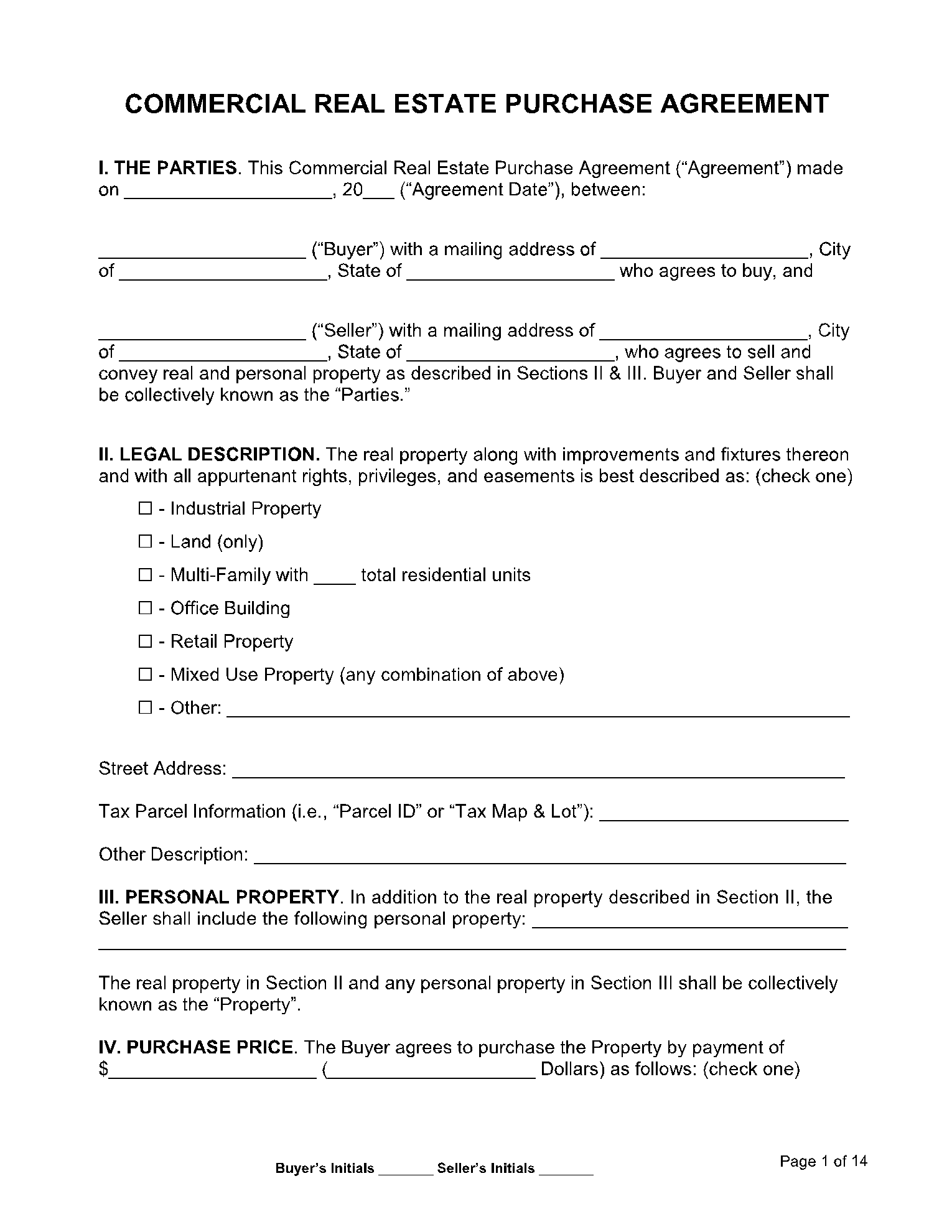Nowadays, if you want to buy or sell a commercial building, the law requires that you prepare a commercial real estate purchase contract. This is something that happens everywhere. The simple real estate contract can only be completed if you fill and sign the purchase forms. To make sure the agreement is legally binding, you must have a written agreement.
If the agreement is not written, it becomes illegal. A commercial real estate purchase contract generally allows the buyer and the seller to make a mutually benefiting contract for the purchase of the property. If the buyer needs financing or paying cash, there’s always a timeframe of up to 180 days for general contingencies and inspections.
What's a Commercial Real Estate Purchase Contract?
A commercial purchase agreement is a document that allows both the seller and buyer to agree to transfer the ownership of the real estate in exchange for cash. As a legally binding document, it outlines all the terms and conditions. This simple real estate purchase agreement ensures that no party breaches the contract.
For the contract to be valid, the buyer must deposit some money known as consideration. This money is usually between 2% and 5% of the purchase price of the house. Unless there are problems found in the property during inspection, this money will be refunded. Prepared by the building owner, it outlines the rights and obligations of both the buyer and seller.
What’s included in A Commercial Real Estate Purchase Contract
A commercial real estate purchase contract may overwhelm you if you see it for the first time. A lengthy document, a commercial real estate contract form, contains several unfamiliar concepts and terms. It’s, therefore, vital that you understand the free blank purchase agreement form. Here are the main things included in a commercial real estate purchase contract.
- Name and address of the parties involved:
This part outlines the property at stake and includes a clear legal description and the exact address of the property. It also provides for the identity of both the buyer and seller.
- Price and Terms:
The contract should include the offered price of the property and the means of payment. The main methods are payment in full, mortgage, or payment by installment.
- Closing Dates and Cost:
The closing date of the commercial real estate contract should also be included in the purchase agreement. Upon the listed closing date, the typical ownership transfers to the buyer.
- Real estate taxes:
At the closing date of the property, taxes and other costs should be prorated.
- Items to be included:
A commercial real estate purchase agreement form should thoroughly document all the items that should be included. These may consist of heating and cooling equipment, light fixtures, doors, window treatments, bathroom fixtures, and built-in kitchen appliances.
- How disputes will be resolved:
There should be a mechanism for dispute resolution in case one party defaults.
- Delivery, acceptance date, and offer expiration:
Both the buyer and the seller should know when the contract will expire if not accepted. This should be clearly outlined in the agreement.
- Signatures:
The buyer and seller should also append their signatures agreeing to the terms of the commercial real estate sales agreement.
How to Fill a Commercial Property Real Estate Contract
Just like other agreements, filling a commercial property purchase agreement requires a lot of effort. You must familiarize yourself with the terms used in real estate and sign a contract to avoid future legal complications. Once you have downloaded the commercial real estate from here. You can follow the steps given below to conclude a commercial real estate purchase and sales agreement:
- The first step is to write down your offer price.
- Fill out the commercial real estate purchase agreement.
- Explain the terms and conditions.
- If there are any buyer contingencies, list them.
- Check if there are any repairs to be done by the seller.
- Lay down the final price mechanism for revocation and addendum.
- Discuss any other terms and conditions put forward by either party.
- Both parties put their signatures.
- Execute the contract.
Conclusion
Besides the property, each buyer and seller is unique. You, therefore, need to be careful while completing a commercial real estate contract and only put your signature when you are satisfied. By understanding the above information and terms, you’ll have an advantage at the negotiating table.
